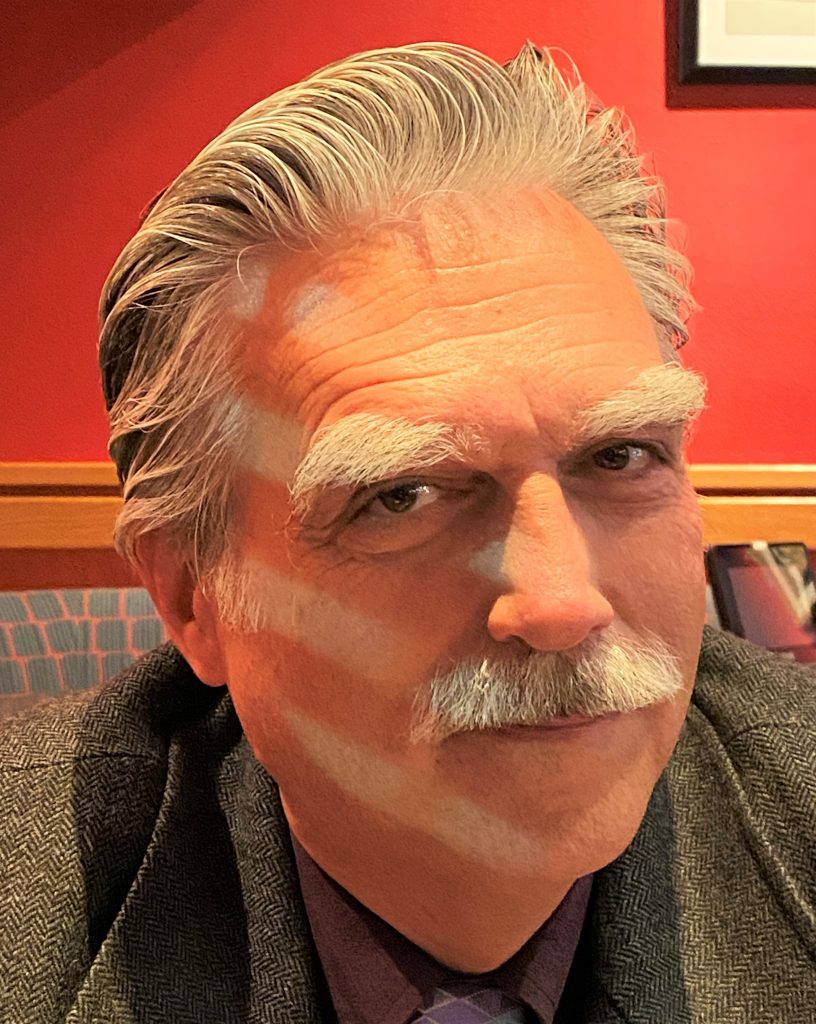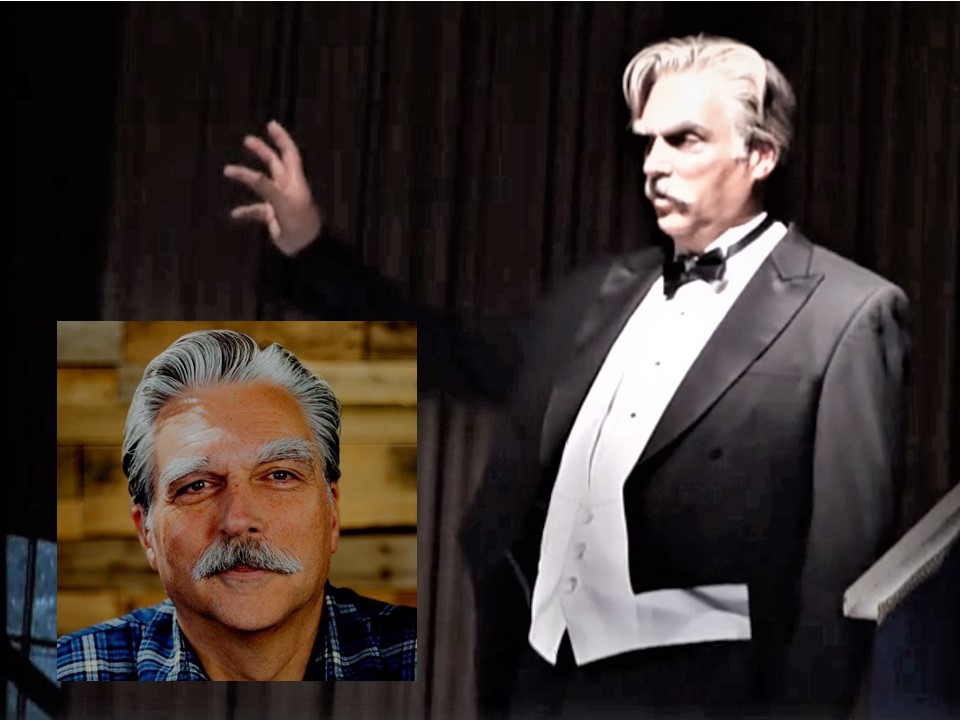
Author Mark Twain serves as inspiration for Northern California native B. Clay Shannon, a CDCR Case Records Analyst. He’s worked for the department since July 2018. Shannon’s interest in Samuel Clemens, better known as author Mark Twain, began at an early age.
While he enjoys his job at the Correctional Training Facility at Soledad, his love of history and Twain’s writing has led him to a hobby breathing life into the literary icon. His current job is part of a training and development program.
Mark Twain isn’t his first time donning period attire to recreate a person from history.
“(At one time) I worked for the State of Wisconsin as a costumed interpreter at Old World Wisconsin where I dressed in period clothing from the 1800s and told visitors about whichever house or building I was working in that day – the year being presented, what was happening then, who lived or worked there, etc.,” he said.
Inside CDCR caught up with Shannon to discuss how he strives to achieve work-life balance.
Q&A with B. Clay Shannon
What’s the best part about your job?
This may sound strange to some, but I actually enjoy the math involved in calculating release dates for inmates. But the best part of the job is the esprit de corps that builds from collaborating with my workmates. We have a good team here.
What advice would you give to someone interested in joining the CDCR team?
Don’t be intimidated by the way prisons are depicted in TV shows and movies. Also, once you start, be alert to the variety of work that is done at CDCR and be prepared to take advantage of opportunities that present themselves to move into roles beyond what you were originally hired to do. In other words, there are opportunities for advancement for those interested in that.
History interest goes back into childhood
When did you become interested in history?
As far back as I can remember but the way it is taught in school is often quite dull. I am primarily interested in U.S. history, more especially the West, meaning west of the Mississippi, and specifically my native state of California. The time period which interests me the most is that which corresponds to Mark Twain’s lifetime: 1835-1910. This includes the California Gold Rush and statehood, the Civil War, and the introduction of several inventions by Edison, Tesla, Bell and others that dramatically changed daily life. Inventions such as the electric light, telephone, phonograph, automobile, and airplane.
Was there a person/teacher/mentor who sparked the history interest?
My mother introduced me to Mark Twain’s writings at a very young age. From then on, I imagined what life was like “back in them days.” “The Adventures of Tom Sawyer” as well as “Adventures of Huckleberry Finn” are set in the 1840s, when Twain was growing up in Hannibal, Missouri, on the banks of the Mississippi River.
The lure of Twain’s writing
What is it about Mark Twain that draws you to his work?
First off, his writing is just flat-out fun to read. Also, his work is timeless. Twain’s good friend William Dean Howells was a leading author of their time, too. Twain even predicted that in the decades and centuries following their deaths, Howells would be remembered, but he himself would not. The opposite has turned out to be the case. The staying power of Twain is precisely because of the fact that what he wrote applies across time and space.
You can read and re-read Twain’s books several times throughout your life and get something different out of them each time. It’s as if the barrel of the kaleidoscope has been given a couple of twists, and those revolutions cause the same pieces to appear in completely different ways.
I also love Twain’s diction; although sometimes it is a bit archaic, for me the quaintness that his choice of words lends to his work is a big part of its appeal. He was a stickler for always using the right word rather than the “almost-right” word.
How long have you been recording your Mark Twain readings?
A couple of years now. They can be accessed on YouTube and my “AdventuresOfMarkTwain” Facebook page. I speak in my “Mark Twain voice” when I record them, using an eastern Missouri/Kentucky/Tennessee accent. Twain’s mother was from Kentucky, and the family lived in Tennessee prior to relocating to Missouri. In fact, Twain was conceived in Tennessee, although born in Missouri.
Mark Twain interest has evolved over the years
How has your interest in Twain grown?
By continuing to read all of his works, and by reading about his life and times.
After the obligatory introduction to “Tom Sawyer” and “Huck Finn,” I branched out into “Roughing It” (his exaggerated account of his years in Nevada and California), “The Innocents Abroad,” “A Connecticut Yankee in King Arthur’s Court,” “Life on the Mississippi,” and then his short stories, essays, letters, newspaper articles, and speeches. My fascination with Twain and his action-packed and varied life led me to writing a concise biography-masquerading-as-an-autobiography of him entitled “Rebel With a Cause: Mark Twain’s Hidden Memoirs.”
Also, it doesn’t hurt that Twain and I have quite a few things in common. Just to name a few, we have both been miners; we both lived not only in California, but also in Missouri and New York; and both of us have a special connection to Angels Camp, California — it’s the first place my wife and I lived after we got married, and it’s where Twain heard the story of the jumping frog which he turned into the famous sketch “The Celebrated Jumping Frog of Calaveras County,” which helped launched his career.
Mark Twain took stand against animal cruelty
How has Twain’s writing inspired you in your everyday life?
Although viewed by some as a curmudgeon, or even a grouch in his later years, Twain was a very good person: a faithful husband, loving father, and loyal friend. He was courageous in his convictions, and stuck up for the downtrodden on many occasions, including foreigners, the disenfranchised, and the marginalized. He even took a stand for animals, such as by writing articles opposing vivisection and bullfighting.
As one example of his showing courage, read his story “Traveling with a Reformer,” which is about a man who refuses to allow the railroad company to infringe on his rights. This was based on a true story, with Twain as the protagonist. In the fictionalized version, it is someone else who champions the rights of the common people.
Twain helps employee strike a balance
How does your hobby help you maintain a work/life balance?
It’s always good to “reset” and concentrate on something totally different than work from time to time. My “playing Twain” is also an excellent way for me to do some virtual time traveling; as the Moody Blues song says, “Thinking is the best way to travel.” When I record Mark Twain’s writings, I get in a “place” where I almost convince myself that I really am Mark Twain, adopting his personality and viewpoints, and keeping his personal history in mind.
Is there anything else you’d like to add?
A miniseries of Twain’s life could be a masterpiece, if done right.
By Don Chaddock, Inside CDCR editor
Office of Public and Employee Communications
See more stories highlighting CDCR/CCHCS staff.
Follow CDCR on YouTube, Facebook, X (formerly Twitter). Listen to the CDCR Unlocked podcast.
